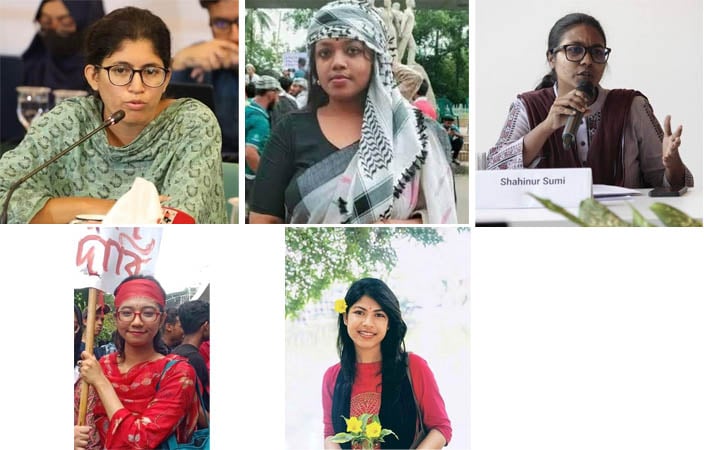News Flash
News Flash

DHAKA, Nov 5, 2024 (BSS) - After a long time in the country's history, the people of Bangladesh has begun to keep their utmost trust in the government and seem to own the state due to its inclusive approaches in taking decisions and common people's concerns into account, said female coordinators and protesters of July mass upsurge.
"No political, caretaker or military-led government in the history of 53-year old Bangladesh earned that much public trust, the way the interim government earned the trusts of people irrespective of their beliefs and ideologies...and it is the most significant success of the interim government," said Nusrat Tabassum, a key coordinator of Anti-Discrimination student Movement.
Talking to BSS, the coordinators and frontline female protesters suggested the government to take stern actions to break market syndicates, effective measures to ensure security of each citizen, measures to protect the revolutions and adding a maximum number of people in reforms and the country's rebuilding activities.
Nusrat praised the government's two major positive characteristics-reviewing decisions or correcting mistakes and giving enough value to the public's views and said, "The previous government used to ignore what common people think or want; rather they used to give very irrational alternatives whenever demand arose on something to change or improve".
She said since the government took charge of the state, the citizens, with huge expectations and optimism in their faces, have been rushing to student coordinators, protesters and government officials including the advisers with their problems from very small to major issues including those they never talked about before.
The most significant success of the interim government is that despite witnessing multiple demonstrations, the government managed to earn people's trust, Nusrat said, adding, "If the government was not formed through a massive mass uprising, the scenario would have been different...may be like some other previous government."
Mentioning that the government managed to make them as people's government, she said, "The actual scenario on the ground is quite different from what we see in social media about people's views...when we talk with people, they never say 'the government will fail' rather they say, 'you have to give them time as they (the government) just took charge'."
Spokesperson of Anti-Discrimination Student Movement Umama Fatima said keeping trust in the government, the people have been safeguarding the government and working with it spontaneously in each ground-political, economic or social.
"During floods or poor law and order situations, we saw how people stood by flood victims, sacrificing lives to save others, managing traffic, cleaning streets or spending sleepless nights gathering in groups to maintain law and order," she said.
Umama said due to the citizen's trust in the government, the rate of migrant workers sending money through banking channels instead of other illegal channels has increased significantly, boosting the country's incoming remittance flow.
However, Umama suggested the government to be more communicative with people, preparing a roadmap for the reforms by the formed commissions and introducing services -- directly supervised by the government -- to bring the price of essential commodities to a tolerable level.
Rupaiya Shrestha Tanchangya, a protester who has been involved in the movement since the first day till victory, praised government's approaches to take opinions from people with diversified backgrounds before formulating policies or taking decisions.
"I have never seen any government taking people's opinions irrespective of their beliefs and ideologies and giving that much importance, the way interim government does," Rupaiya added who also participated in a views-exchange meeting on reforms.
The interim government's immediate and successful responses to some crises including flood, security or price hike and taking an inclusive approach in addressing issues connecting all stakeholders made it earn people's trust, said Nazifa Jannat, central coordinator from East West University.
The government should work on priority basis to ensure security of each citizen at each corner of the country and take immediate and stern actions to terminate all the market syndicates from its route, said Nazifa.
"If the government fails to address the problems related to its citizen's basic needs or increasing citizen facilities, it will lose its trust afterwards," Nazifa said, adding, "People will lose their patience, if they don't see visible improvements in citizen's basic needs or expectations."
Movement's coordinator from Eden Mohila College Shahinur Shumi said, "People's aspirations and expectations are very high towards the government as it comes through sacrifices of lives... developing relations with international community's is also a vital thing, but the government should give more focus on addressing local issues".
"I think the government is giving less importance to some issues that is - breaking market syndicates, protecting the memories of the July revolution, taking care of the injured and upholding the spirit of 2024", she said.
Sumi stressed for radical initiatives to address price hike of essentials and security issues saying, "For most of the people, it doesn't matter whoever came into power or ruling the state rather they are satisfied after getting relief from the long-suppression and suffocation created by the previous Awami Regime."
What matters for people is whether the price of essentials is being reduced or the law-and-order situation is being improved or the citizens' quality of life is improved, she added.